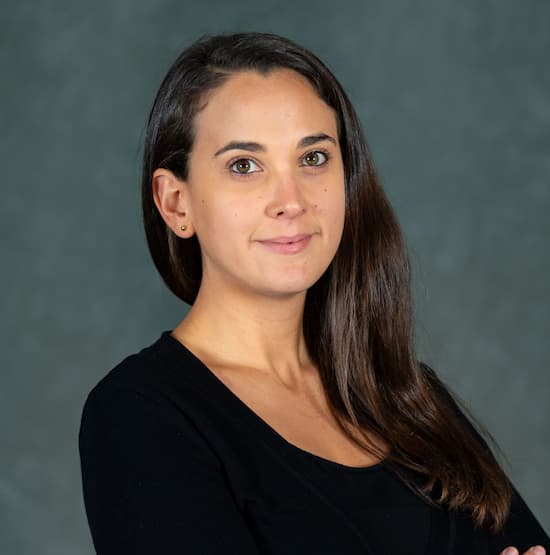Ph.D. Marine Science & Conservation, Duke University, 2019
B.S. Biology, Georgetown University, 2010
Vivienne Foroughirad
Assistant Professor
Department of Marine Biology

E-mail: vforough@tamug.edu
Phone: +1 (409) 740-4527
Fax: +1 (409) 740-5001
Ocean & Coastal Studies Bldg., Office 254
Website
CV
Learn more about Vivienne Foroughirad
- Get To Know
Vivienne Foroughirad
What in your life drew you to your current field of study?
I've always been interested in how animals interact and why they do, or do not, live in groups. Cetaceans exhibit a vast array of social structures from the more solitary baleen whales to superpods of oceanic dolphins. This diversity drew me to question how ecological and evolutionary pressures in the marine environment have shaped these varied structures, and how features of the social environment- such as density, stability, and connectedness- can predict individual and population health and fitness in turn.
What do you hope your students gain from studying or working with you?
I endeavor for my students to gain a solid foundation of first principles and skills, and to build a community of supportive collaborators that will allow them to pursue any number of scientific interests.
What are you passionate about in your personal life?
Family and nature.
- Education
- Publications
McEntee, M.H.F., Foroughirad, V., Krzyszczyk, E. & J. Mann. (2023) Sex bias in mortality risk varies with age and sex specific selection pressures across the lifespan of bottlenose dolphins. Proceedings of the Royal Society B. doi:10.1098/rspb.2023.0675
Dolezal, M., Foroughirad, V., Fish, F., Jacoby, A.M., Collier, M., Murphy, C., Rittmaster, K., Bansal, S., Mann, J. (2023) Some like it hot: Temperature and hydrodynamic factors influence Xenobalanus globicipitis attachment to cetaceans. Marine Mammal Science. doi:10.1111/mms.13022
Foroughirad, V., Frère, C.H., Levengood, A.L., Kopps, A.M., Krzyszczyk, E. & J. Mann. (2023) Small effects of family size on sociality despite strong kin preferences in female bottlenose dolphins. Animal Behaviour. doi:10.1016/j.anbehav.2022.10.011
Foroughirad, V., McEntee, M. H., Kopps, A.M., Levengood, A.L., Frère, C.H & J. Mann. (2022) Reproductive timing as an explanation for skewed parentage assignment ratio in a bisexually philopatric population. Behavioral Ecology and Sociobiology. 76, 129. doi:10.1007/s00265-022-03233-2
Levengood, A. L., Strickland, K., Foroughirad, V., Mann, J., Cristescu, R.H., Krzyszczyk, E.B., Frère, C. (2022) Heterogeneity of resource competition shapes individual variation in dolphin social behavior. Behavioral Ecology. Volume 33, Issue 4, July/August 2022, Pages 745–757, doi:10.1093/beheco/arac037
Strickland K., Mann J., Foroughirad V., Levengood A.L., Frère C.H. (2021) Maternal effects and fitness consequences of individual variation in bottlenose dolphins’ ecological niche. Journal of Animal Ecology. 2021; 00:1–13. doi:10.1111/1365-2656.13513
Mann, J., Foroughirad, V., McEntee, M.H., Miketa, M.L., Evans, T., Karniski, C.B., Krzyszczyk, E.B., Patterson, EM., Strohman, J., Wallen, M.M. (2021) Elevated calf mortality and long-term responses of wild bottlenose dolphins to extreme climate events: Impacts of foraging specialization and human provisioning. Frontiers in Marine Science. 8:617550. doi:10.3389/fmars.2021.617550
Galezo, A., Foroughirad, V., Krzyszczyk, E., Frère, C. & Mann, J. (2020). Juvenile social dynamics reflect adult reproductive strategies in bottlenose dolphins. Behavioral Ecology. doi:10.1093/beheco/araa068
Powell, S.N., Wallen, M.M., Miketa, M.L., Krzyszczyk, E., Foroughirad, V., Bansal, S. and Mann, J. (2019) Sociality and tattoo skin disease among bottlenose dolphins in Shark Bay, Australia. Behavioral Ecology. doi:10.1093/beheco/arz207
Foroughirad, V., Levengood, A., Mann, J. & Frère, C. (2019) Quality and quantity of genetic relatedness data affect the analysis of social structure. Molecular Ecology Resources. doi:10.1111/1755-0998.13028